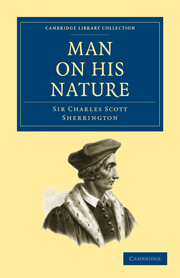Book contents
- Frontmatter
- Preface
- Contents
- Illustrations
- I Nature and Tradition
- II The Natural and Superstition
- III Life in Little
- IV The Wisdom of the Body
- V Earth's Reshuffling
- VI A Whole Presupposed of its Parts
- VII The Brain and its Work
- VIII The Organ of Liaison
- IX Brain Collaborates with Psyche
- X Earth's Alchemy
- XI Two Ways of one Mind
- XII Conflict with Nature
- Index
XI - Two Ways of one Mind
Published online by Cambridge University Press: 07 September 2010
- Frontmatter
- Preface
- Contents
- Illustrations
- I Nature and Tradition
- II The Natural and Superstition
- III Life in Little
- IV The Wisdom of the Body
- V Earth's Reshuffling
- VI A Whole Presupposed of its Parts
- VII The Brain and its Work
- VIII The Organ of Liaison
- IX Brain Collaborates with Psyche
- X Earth's Alchemy
- XI Two Ways of one Mind
- XII Conflict with Nature
- Index
Summary
Our' loves so truly parallel though infinite can never meet.
A. Marvell.Why then should we separate mental activity and cerebral activity seeing that the two are identical?
C. S. Myers, In the Realm of Mind.Latterly our theme touched more than once the question of the relation between the two concepts ‘energy’ and ‘mind’. I would venture here to turn specifically to that relation. To leave its argument, as that appears to me, merely tacit, might seem to invite mystery in a matter on which I would wish to arrive at clear expression. But over and above that there is an importance proper to the question. It has theoretical importance; that is perhaps generally admitted. But its claim to practical importance is apt to raise a smile. Yet the question surely touches the reading of man's situation in his world.
We need not think of it as an issue between idealism and materialism. Nor does it touch so-called ‘reality’, our world is in any case an act of mind. It asks rather whether the world, as our mind apprehends it, is for one part of it known to us in one way, for its other part known to us in another, the two ways not of essential parity. One form in which the question states itself is how far the world as known to us is fundamentally of one kind throughout. We may then regard the question as that of dualism or monism in a limited scope, that is, with no reference to reality.
- Type
- Chapter
- Information
- Man on his Nature , pp. 323 - 358Publisher: Cambridge University PressPrint publication year: 2009First published in: 1940



